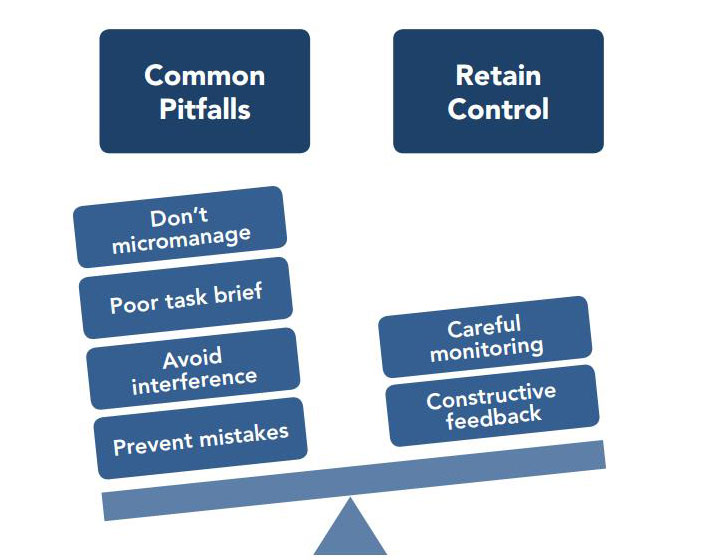Feel Free to Delegate. Part 2
Consider 9 tips to delegate effectively
1 Get the ball rolling.
The first step is the hardest, but it’s the most crucial. You’ve got to ask someone to help you Don’t be afraid to delegate because you may be seen as rude or imposing. Look at it this way — how do you feel when people ask you for help? Are you hurt and offended? Or are you (usually) perfectly willing to help? Probably the latter! Don’t pressure your helper, but be sure that s/he knows his or her help is needed.
2 Don’t take refusals personally.
Sometimes, people can’t help you — it’s sad, but true. This can be for a variety of reasons. Don’t take this too personally — just because someone can’t (or won’t) do something for you at the moment doesn’t mean s/he hates you. It usually just means that the s/he is either busy or lazy — nothing more.
If you’re refused, consider your options — usually, you can politely but firmly insist that you really need this person to help (which will work especially well if you’re a boss or someone else with authority), you can try asking someone else, or you can do the work yourself. If you really need help, don’t be afraid to try options one and/or two!
3 Delegate the objective, not the procedure.
This is the key! Set clear standards for what kind of results you’re looking for, and show the person how you do it, but tell them that they can do it any way they want, as long as it’s done well and it’s completed on time.
4 Be prepared to train your helper.
You should almost always set aside a little time to teach your helper how to do the task you’ve delegated to him or her, even if it’s quite simple. Remember that processes that seem straightforward and simple to you might not be so simple to someone who’s never dealt with them before. Be ready not only to walk your helper through the work you’ve delegated to him or her, but also to patiently answer the questions that s/he will probably have. Consider the time you spend training a helper to be a wise long-term investment.
5 Provide the resources necessary to complete the task.
You may have resources available that are necessary to complete the task but the person given the task may not be able to access them. Things like password protected data, specialized equipment, and certain tools can be vital to the completion of this task, so make sure your helper has whatever s/he needs to succeed.
6 Understand that your helper can only do one thing at once.
When your helper is helping you, s/he isn’t doing his or her normal responsibilities. Don’t forget that, like you, your helper likely has a tight schedule. Ask yourself — what work will they set aside or delegate in order to complete your task? Be sure you know the answer to this question when you delegate a task to someone.
7 Be patient.
The person to whom you delegate will make mistakes while s/he is learning how to do a new task. It’s part of the learning process. Plan for it. At first, it’ll slow you down, but in the long run, it’ll increase productivity by leaps and bounds, for you’ve approached the whole thing with a positive and realistic attitude.
8 Be prepared for likely difficulties.
Implement backup plans and be ready to jump in if things go wrong. Know what will happen if a benchmark or deadline is missed. Obstacles and unexpected challenges pop up all the time, whether you’re at work or at home — even technology fails sometimes. Delegate not fear, but trust in the fact that, if something comes up, you will understand and help him or her to meet that deadline.
9 Recognize your helper and say “Thank You”.
Delegating tasks to someone else is necessary if you are to take on more and more responsibility. However, it’s counterproductive when you delegate a task, let your helper work hard on it, and then take all the credit for yourself. Recognize and praise the efforts of others on your behalf and acknowledge the importance of his or her help, let the helper know s/he is appreciated. Remember that people can’t read your mind. A simple heartfelt acknowledgement like, «I couldn’t have done it without you!» can go a long way.
Glossary:
| Get the ball rolling | Сдвинуться с мертвой точки | Access something | Иметь доступ к чему-либо |
| Crucial | Крайне важный | Be vital | Быть жизненно важным |
| Be imposing | Навязанный | Make sure | Убедиться |
| Be offended | Обидеться | Tight schedule | Плотный график |
| Take something personally | Принимать на свой счет | Set something aside | Отложить что-либо |
| Insist firmly | Твердо настоять | By leaps and bounds | Семимильными шагами |
| Delegate objectives | Делегировать задачи | In the long run | В долгосрочной перспективе |
| Complete on time | Закончить вовремя | Implement back-up plans | Применить запасной вариант |
| Be straightforward | Быть очевидным | Jump in | Включиться (в работу) |
| Walk somebody through something | Провести кого-то через что-то | Miss/meet a benchmark or deadline | Не успеть/успеть к сроку |
| Long-term investment | Долгосрочные вложения | Pop up | Всплыть |
| Counterproductive | Антипродуктивно | Recognize the efforts | Признавать усилия |
| Efforts of others on your behalf | Усилия, сделанные для вас | Take all the credit | Присвоить все заслуги |
| Read your mind | Читать ваши мысли | Acknowledge the importance | Признать важность |
Over to you:
Which recommendation is completely new for you?
Which one do you find most useful? Why?
Can you add anything from your experience?
Consider common pitfalls of delegating

Glossary:
| Common pitfalls | Распространенные ошибки |
| Micromanage | Контролировать каждый шаг |
| Task briefing | Объяснение задачи |
| Avoid Interference | Избегать вмешательства |
| Retain control | Сохранять контроль |
Over to you: Can you think of other mistakes people make when delegating tasks?




